Egypt army gives Mursi 48 hours to share power
Updated: 2013-07-02 06:29
(Agencies)
|
||||||||
On Tahrir Square, thousands celebrated the army's move with a fervour that recalled its unsentimental removal of Mubarak at the end of 18 days of protests and bloodshed: "We want a new armed forces council to govern until new elections," said accountant Mohamed Ibrahim, 50. "The army alone supports the legitimate revolutionary will of the people."
Amr Moussa, a liberal politician and former foreign minister who stood in last year's presidential election, said: "The invitation to meet the demands of the people within the next few hours is a historic opportunity which should not be lost."
It was the second time in just over a week that the armed forces had issued a formal warning to the politicians, piling pressure on Mursi to concede power-sharing.
Analysts said the military intervention could serve Mursi if he wished to compromise, but it risked emboldening his opponents to harden their demands, at the risk of triggering a coup.
"The ultimatum has the ring of a potential coup," said Yasser al-Shimy of the International Crisis Group think-tank.
"What makes it not a coup is it gives time for the politicians to sort out their differences."
The second biggest Islamist group in parliament, the Nour Party, said it feared the return of army rule "in a big way" and urged Mursi to compromise with his opponents.
A later military statement denied the move was a "coup" and was only a response to the "pulse of the Egyptian street".
The armed forces have influenced Egyptian politics since army officers staged the overthrow of the monarchy in 1952.
They also receive significant funding from the United States, whose top military officer, General Martin Dempsey, called the chief of staff of Egypt's armed forces on Monday morning, a U.S. defense official told Reuters, without giving details of the conversation.
|
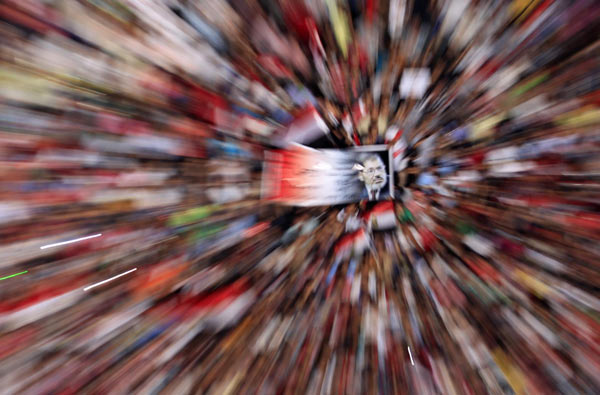 |
|
Protesters holding a poster opposing Egyptian President Mohamed Mursi shout slogans against him and Brotherhood members during a protest at Tahrir square in Cairo July 1, 2013.[Photo/Agencies] |
Self-defence?
After the destruction of its offices, the Brotherhood which operated underground until the overthrow of Mubarak in 2011, said it was considering how best to defend itself.
Mursi supporters congregated near a Cairo mosque that has been their focus for the past 10 days. Some were bitter at the irony of liberal leaders embracing the army:
"The world always thought we Islamists didn't believe in democracy," said Hassan al-Sherbeny. "Now Islamists are teaching Egyptians democracy while the liberals are giving up democracy.
"And where is the world's reaction to all that?"
Five non-Brotherhood government ministers tendered their resignations from the cabinet, apparently in sympathy with the protesters, underlining a sense of isolation for the party that won a series of elections last year but has failed to build out alliances to form a broader consensus.
"Both sides are still in their trenches," a senior European diplomat said just before the military statement.
Eight people died in a night of fighting around the Brotherhood headquarters, where guards fired on youths hurling rocks and fire bombs. A Brotherhood official said two of its members were hurt. Another eight people were killed and 731 injured in clashes around the country on Sunday.
Unknown attackers also firebombed the headquarters of the moderate Islamist Wasat party allied with the Brotherhood. The party called in a statement for dialogue among all parties.
Security sources said security forces arrested 15 bodyguards of Brotherhood deputy leader Khairat El-Shater after an exchange of gunfire with them outside his home. The guards are suspected of illegal possession of firearms used in the shooting at the movement's headquarters, the sources said.
The Brotherhood's political wing denied the arrests, saying only Shater's driver had been "kidnapped".
The Brotherhood's official spokesman told Reuters that the attack on its headquarters had crossed a red line of violence and among possible responses might be to revive "self-defence committees" former during the 2011 uprising.
"The people will not sit silent," Gehad El-Haddad said.
Mursi's movement complained at the lack of police protection, which can only heighten its sense of being under siege from both the liberal opposition and state officialdom inherited from the old regime.
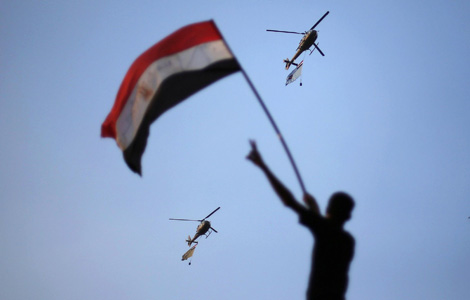
 Egypt army gives Mursi 48 hours to share power
Egypt army gives Mursi 48 hours to share power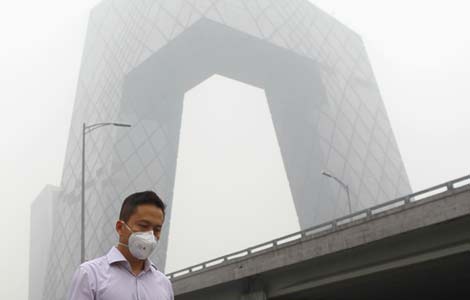
 No quick end in sight for Beijing smog
No quick end in sight for Beijing smog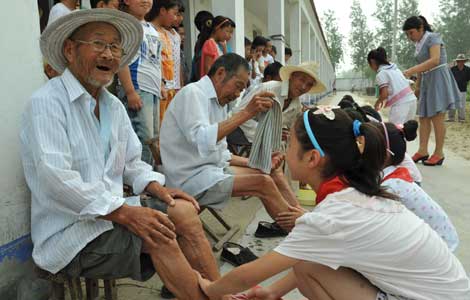
 New filial law sparks debate
New filial law sparks debate
 Bakelants claims Tour de France second stage
Bakelants claims Tour de France second stage
 2013 BET Awards in Los Angeles
2013 BET Awards in Los Angeles
 Gay pride parade around the world
Gay pride parade around the world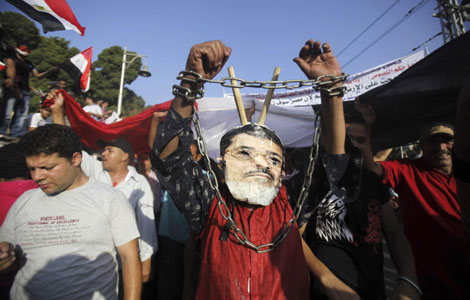
 Four dead in Egypt clashes, scores wounded
Four dead in Egypt clashes, scores wounded
 New NSA spying allegations rile European allies
New NSA spying allegations rile European allies
Most Viewed
Editor's Picks

|

|

|

|

|

|
Today's Top News
Snowden threats to make new US leaks
Book reveals islands' true history
Tokyo warned not to resort to 'empty talk'
Snowden applies for Russian asylum
No quick end in sight for Beijing smog
New home prices defy curbs
Mandela 'still critical but stable'
Shanghai to open first Sino-foreign high school
US Weekly

|

|







